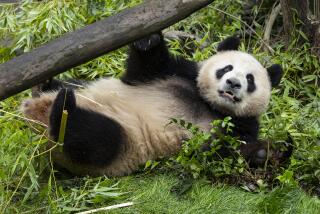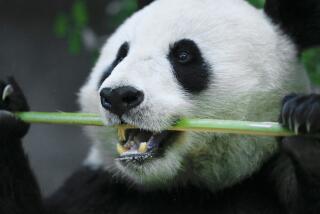A very pregnant pause: San Diego waits to see if Bai Yun the panda is expecting
- Share via
Call it a uniquely San Diego kind of summer anticipation: waiting to see whether Bai Yun is pregnant.
At 24, Bai Yun, a giant panda, is a superstar at the San Diego Zoo. She has given birth to six cubs, starting in 1999. If she has a seventh, it most likely will be her last.
For weeks, zookeepers have been monitoring Bai Yun with ultrasound, thermal imaging and hormone testing. Her den is kept quiet with only essential personnel allowed in the area.
For complex reasons not fully understood by scientists, panda pregnancy is difficult to achieve and difficult to detect. For starters, the female is in season only two to three days a year.
Even if mating — or artificial insemination — has occurred, it is months before it is known whether it was successful. In the early stages, determining whether a panda is pregnant is part science, part art.
“If her eyes look soft, it says to me that she is content,” said Kathy Hawk, a senior keeper.
In March, the 240-pound Bai Yun was artificially inseminated with sperm from Shi Shi, her first intended mate who had proved uninterested in physical contact when the two first arrived from China.
He was sent back to China, but his sperm is on file at the Frozen Zoo at the zoo’s Institute for Conservation Research.
With Bai Yun near the end of her reproductive years, zoo officials did not want to miss the last opportunity for the panda to achieve maternity.
Her mate, Gao Gao, is 25. His cancerous right testicle was removed in 2014. His left testicle showed no sign of cancer, zookeepers said.
When the two were put together earlier this year, nothing happened. The call then went out for Shi Shi’s sperm and the delicate procedure was accomplished.
Bai Yun’s first cub, Hua Mei, born in 1999, was the first panda cub born in the United States to survive to adulthood. Shi Shi’s sperm was used through artificial insemination. Bai Yun’s next five cubs were sired by Gao Gao, the natural way.
On Friday, zoo officials said they are not yet prepared to make an announcement.
Zoo officials may ask the Chinese government to allow Bai Yun and Gao Gao to retire at the San Diego Zoo in emeritus, nonreproductive status. The zoo would like the Chinese to send two younger pandas to continue the breeding program.
If so, the civic anticipation of is-she-or-isn’t-she? will resume.
More to Read
Sign up for Essential California
The most important California stories and recommendations in your inbox every morning.
You may occasionally receive promotional content from the Los Angeles Times.










